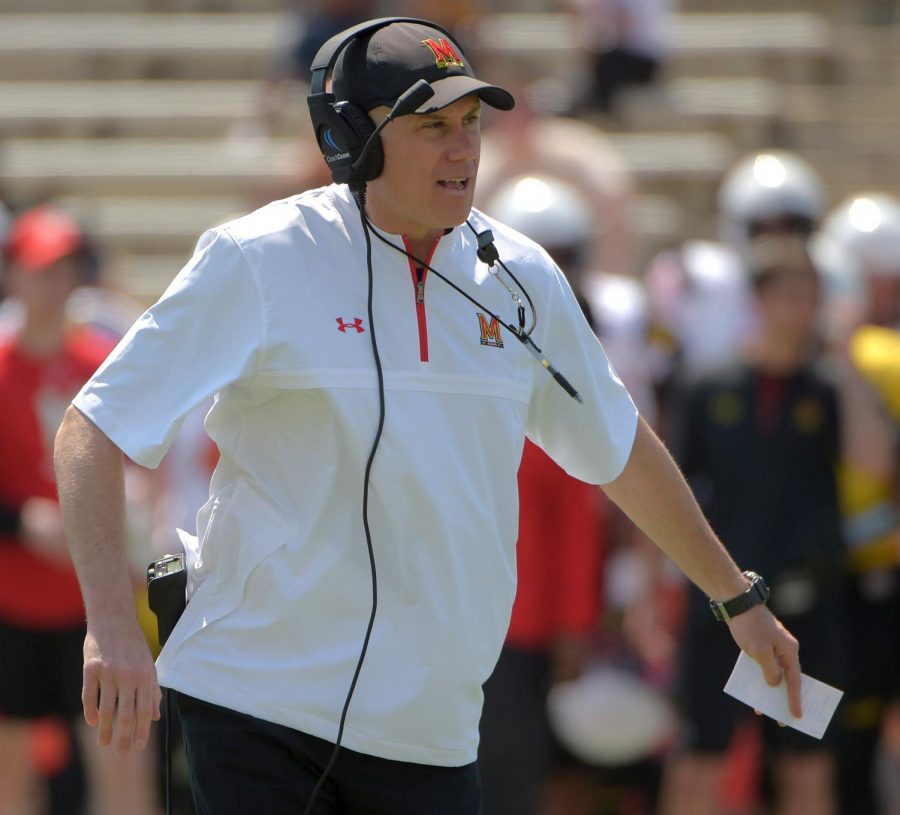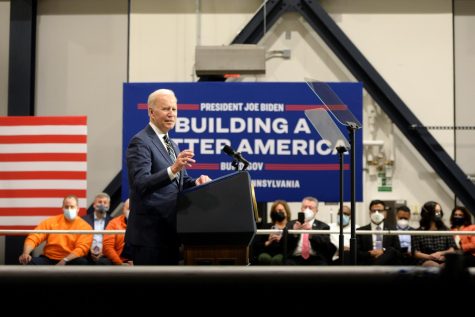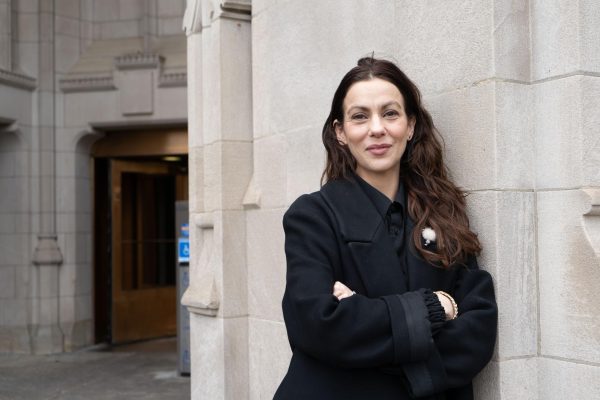Durkin doesn’t deserve to coach again
Karl Merton Ferron/Baltimore Sun/TNS
Former Maryland head coach D.J. Durkin was hired as an assistant coach at the University of Mississippi last month.
January 7, 2020
People often misuse the word “tragic.”
It’s typically followed by “accident” or “incident” and paired with “unfortunate.” It implies that whatever happened was unavoidable. All you can do is shrug your shoulders and say oops.
Recently, “tragic” has been misused time and time again to describe the death of former Maryland football player Jordan McNair. His head coach D.J. Durkin, strength coach Rick Court and Maryland’s athletic administration all came under scrutiny, and the conclusions of the investigations paint Durkin as someone unfit for a college coaching job — though that didn’t stop Ole Miss from hiring him last month.
McNair died after being hospitalized for heat stroke in May 2018 after passing out during an offseason workout. An independent investigation conducted by athletic training consultant Rob Walters and released the following August concluded that not only were the proper precautions for workouts in the heat not taken, but response time to McNair’s condition was reprehensibly slow.
Walters’ report states that it took 34 minutes after McNair began showing symptoms for the medical staff to remove him from the field and 67 minutes before 911 was called. Simply put, every football staff member present failed McNair, and the most heartbreaking part of his story is that it comes as no surprise, particularly to his teammates, who remained anonymous when interviewed by multiple media outlets.
“It shows a cultural problem that Jordan knew that if he stopped, they would challenge his manhood, he would be targeted,” one of the current players said. “He had to go until he couldn’t.”
A separate report commissioned by the University System of Maryland’s Board of Regents on the football’s program culture paints a damning picture of how Durkin, whose first stint as a head coach was at Maryland, ran his program. According to interviews, there was a lack of accountability for his staff, particularly Court, who is said to have constantly verbally and physically abused players.
Some of the alleged stories are horrifying. Court allegedly forced overweight players to eat candy bars while watching other teammates workout, threw a player’s food across the room, forced a player to eat until he vomited and even choked a player with a pulldown bar in the weight room. Completing Court’s workouts were said to have been prioritized over an individual’s safety, lest they be subjected to homophobic slurs and challenges to their masculinity.
But as shocking as the report was, its conclusion was even more upsetting.
“The Maryland football team did not have a ‘toxic culture,’ but it did have a culture where problems festered because too many players feared speaking out,” according to Walters’ report.
A culture where a coach is king and players are held in silence by fear is toxic. Maryland administrators thought so as well. University president Wallace Loh accepted full “legal and moral” responsibility for McNair’s death, to which his parents showed appreciation and uncommon grace.
“While Marty and Tonya [McNair] will never get another day with Jordan, Dr. Loh’s words were meaningful to them and gave them some comfort that he will put the University on the path to change the culture of the program that no Terrapin family will have to endure the heartache and grief that they feel,” McNair’s parents said in a statement released by their lawyer in August 2018.
Durkin was fired two months later, but his unemployment was short-lived. Just one month ago, Lane Kiffin was hired as the University of Mississippi’s head football coach, and one of his first assistant coaching hires was none other than Durkin. Ole Miss athletic director Keith Carter stood by the hire and the school’s vetting process.
“We received consistently strong feedback about Coach Durkin’s strong character and work ethic and his positive impact on the communities and institutions where he was previously employed,” Carter said.
Positive reviews are a likely outcome when dissenters are bullied into anonymity, as former players and staff members attested to in the Walters report. But even those Maryland players courageous enough to speak out, like graduate offensive lineman Ellis McKennie, appear to have been ignored.
McNair was by all accounts a committed teammate and talented athlete, who received offers from powerhouse schools like Ohio State, Alabama and Penn State, though he chose to stay close to home and committed to Maryland in 2017.
But neither his talent nor character is relevant. Regardless of who McNair was, his death was unwarranted. And both the findings of Walters’ independent investigation and the Board of Regents’ commissioned report about the athletic department’s culture under Durkin should have made a strong enough statement to universities everywhere.
However, his top-20 recruiting classes and record as a coach were enough for Ole Miss to overlook these accusations.
Editorials have been written about how Durkin is being “persecuted” and deserves a second chance. There are mistakes that earn second chances. Losing games, missing out on a recruit or dropping a swear word in an interview are worthy of forgiveness. But the actions Durkin has allegedly allowed under his watch are not.
Don’t conflate consequences with persecution. While Durkin has not been ruled responsible in the eyes of the law, the details in the reports should be enough to keep him out of coaching. But Kiffin, by hiring Durkin, has reaffirmed that college football values wins and money over the well-being of its participants.








